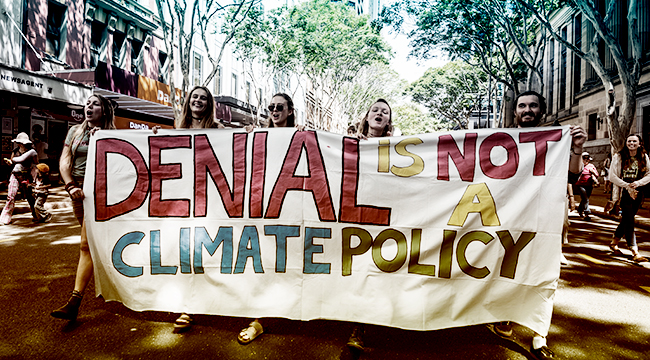If you believe Mark Twain’s famous “Travel is fatal to prejudice, bigotry, and narrow-mindedness,” line, it’s no surprise that keen travelers are often progressive thinkers. “Eco-lodge” was common in backpacker parlance long before energy-efficient houses went mainstream and, generally speaking, travel writers have done a good job seeing through and calling out greenwashing. Even influencers — the most (wrongly) hated vagabonds on earth — have often been part of important travel movements. It was Instagram’s vanlifers and cliff-posers who helped spark a National Parks boom (for better or worse) in a time when the protection of wild spaces is deeply embattled.
Which brings us to the newest travel cause célèbre — flight shaming, or flygskam in the original Swedish. The act of making people feel bad for traveling in planes due to the carbon they burn, in hopes that they’ll consider alternative modes of transport. Trains, most likely, but also busses. Or boats. Last month, climate activist Greta Thunberg sailed to New York City in order to avoid taking a transatlantic flight.
But while big outlets like CNN, Bloomberg, and The Wall Street Journal have covered the flight-shaming movement, travel personalities, influencers, and writers seem to be taking a beat. Which is either interesting or self-incriminating, depending on how jaded you are. Maybe it’s a little of both.
“I think we’re holding our breath because we know we can and should fly less,” travel writer Ali Wunderman (Time, CNTravelers, etc.) says. “But also because we worry about who’s getting the brunt of the blame in this conversation.”
Wunderman’s point speaks volumes. Because while flight shaming feels straightforward, it actually comes freighted with questions of privilege, the utility of shame-as-a-tool, and who has onus in cutting emissions. Questions we should wrestle with while still facing the climate emergency head-on.

When the Wall Street Journal covered flight-shaming, their lede cited “carbon-spewing vacations to Thailand,” one of the most common international destinations for young travelers around the world. It did not, considering its readership or the title of the publication, kick off with corporate travel, which 1) is on the rise, 2) is the sector of travel most easily made obsolete via technology, and 3) has the financial wiggle room to buy carbon offsets or support airlines that do.
This surely won’t surprise Wunderman or other travel writers — young travelers often seem to be the low hanging fruit in these discussions. Who gets missed with all this shame? Private jet flyers. Big businesses. The military-industrial complex. The typical shame-dodging suspects.
The “blamee vs blamer” question is further complicated by the diversity boom in travel right now — with the stories of black travelers, queer travelers, and solo female travelers gaining traction for the first time. These emerging voices are crucial to the widening and deepening of the travel conversation, so flight shaming articles written as these movements surge ought to at least wrestle with that conundrum.
The Swedes, in their wisdom, may already have a solution to the problems that flight-shaming surfaces. On the heels of flygskam comes tågskryt or “train bragging.” Rather than trading in judgment, this new movement (which hasn’t quite taken off yet) has the potential to harness the power of the experience economy. While flight shaming sets us up to feel bad or do the mental gymnastics to avoid feeling bad, train bragging is an invitation to adventure. Rocketing down the West Coast — passing surf breaks and cruisy beach towns — via Amtrak doesn’t deprive the traveler of anything besides a little timeliness and a lot of carbon footprint.
When it comes to flygskam, travel influencers (assuming you’re willing to interpret that term more broadly than “the travelers I hate”) are ahead of the curve. Hell, they’ve been taking photos hanging off trains since Instagram started. And while that platform is so often blamed for the deterioration of travel culture (sometimes even by yours truly), it has given rise to #slowtravel communities, #bikepacking communities, and all sorts of trekking groups. Each of these methods of travel offers a low-carbon travel alternative without the “shame” aspect.

While focusing on travel movements that burn fewer fossil fuels feels nice, it’s not quite as easy as being able to shame everyone we see boarding a plane. And while it’s sure to stir frustrations when older writers, who had quite a bit of climate data at their disposal 30 or even 40 years ago, tell young people to give up traveling, the climate itself might make this whole conversation moot. We really might need to all stop traveling as the climate crisis worsens. Or stop traveling enough to send a message to airlines — where profits are absolutely booming — that they need to invest in solutions.
Because the feeling that Wunderman and others can’t shake is that flight-shaming piles lots of burden on the young flyer. The independent traveler, off to see the world. The 20-something thirsting for new modes of thinking or visiting ancestors abroad (or even just going to a festival). Meanwhile, the increase in corporate travel seems to indicate that the videoconferencing revolution we were promised hasn’t taken hold.
“It often feels like there’s a focus on people trying to broaden their horizons,” Wunderman says, “when travel has so many segments and few of them seem so useful. So while I’m encouraging people to take trips closer to home and focusing my own coverage on that, I worry about who flight shaming silences and who continues to board private jets.”
The fact is that the climate crisis is the ultimate multi-headed dragon and has to be treated as such. Doing nothing hasn’t worked. Doing just “something” isn’t going to do the trick either. It’s going to take a lot of things — from buying offsets to setting strict yearly emissions limits to demanding corporate responsibility. Because while flight shaming every backpacker heading abroad isn’t the ultimate answer, ignoring the problem of travel’s impact on global warming won’t work either.

